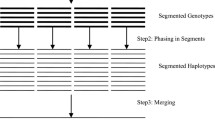Abstract
The Individual Haplotyping MFR problem is a computational problem that, given a set of DNA sequence fragment data of an individual, induces the corresponding haplotypes by dropping the minimum number of fragments. Bafna, Istrail, Lancia, and Rizzi proposed an algorithm of time O(22k m 2 n+23k m 3) for the problem, where m is the number of fragments, n is the number of SNP sites, and k is the maximum number of holes in a fragment. When there are mate-pairs in the input data, the parameter k can be as large as 100, which would make the Bafna-Istrail-Lancia-Rizzi algorithm impracticable. The current paper introduces a new algorithm PM-MFR of running time \(O(nk_{2}3^{k_{2}}+m\log m+mk_{1})\) , where k 1 is the maximum number of SNP sites that a fragment covers (k 1 is smaller than n), and k 2 is the maximum number of fragments that cover a SNP site (k 2 is usually about 10). Since the time complexity of the algorithm PM-MFR is not directly related to the parameter k, the algorithm solves the Individual Haplotyping MFR problem with mate-pairs more efficiently and is more practical in real biological applications.
Similar content being viewed by others
References
Venter, J.C., Adams, M.D., Myers, E.W., et al.: The sequence of the Human Genome. Science 291, 1304–1351 (2001)
The International HapMap Consortium. A haplotype map of the human genome. Nature 437, 1299–1320 (2005)
Gabriel, S.B., Schaffner, S.F., Nguyen, H., et al.: The structure of haplotype blocks in the Human Genome. Science 296, 2225–2229 (2002)
Stephens, J.C., Schneider, J.A., Tanguay, D.A., et al.: Haplotype variation and linkage disequilibrium in 313 human genes. Science 293, 489–493 (2001)
Horikawa, Y., Oda, N., Cox, N.J., et al.: Genetic variation in the gene encoding calpain-10 is associated with type 2 diabetes mellitus. Nat. Genet. 26, 163–175 (2000)
Lancia, G., Bafna, V., Istrail, S., Lippert, R., Schwartz, R.: SNPs problems, complexity and algorithms. In: Proc. ESA, pp. 182–193 (2001)
Bafna, V., Istrail, S., Lancia, G., Rizzi, R.: Polynomial and APX-hard cases of the individual haplotyping problem. Theor. Comput. Sci. 335, 109–125 (2005)
Roach, J.C., Wang, K., Hood, L.: Pairwise end sequencing: A unified approach to genomic mapping and sequencing. Genomics 26(2), 345–353 (1995)
International Human Genome Sequencing Consortium. Initial sequencing and analysis of the human genome. Nature 409, 860–921 (2001)
The International SNP Map Working Group. A map of human genome sequence variation containing 1.42 million single nucleotide polymorphisms. Nature 409, 928–933 (2001)
Hinds, D.A., Stuve, L.L., Nilsen, G.B., et al.: Whole-genome patterns of common DNA variation in three human populations. Science 307, 1072–1079 (2005)
Sanger, F., Nicklen, S., Coulson, A.R.: DNA sequencing with chain-terminating inhibitors. Proc. Natl. Acad. Sci. 74(12), 5463–5467 (1977)
Huson, D.H., Halpern, A.L., Lai, Z., Myers, E.W., Reinert, K., Sutton, G.G.: Comparing assemblies using fragments and mate-pairs. In: Proc. WABI. Lecture Notes in Computer Science, vol. 2149, pp. 294–306. Springer, New York (2001)
Li, L., Khuri, S.: A comparison of DNA fragment assembly algorithms. In: Proc. METMBS, pp. 329–335 (2004)
Wernicke, S.: On the algorithmic tractability of single nucleotide polymorphism (SNP) analysis and related problems. Ph. D. thesis, University of Tübingen, 2003
Panconesi, A., Sozio, M.: Fast hare: A fast heuristic for single individual SNP haplotype reconstruction. In: Proc. WABI. Lecture Notes in Computer Science, vol. 3240, pp. 266–277. Springer, New York (2004)
Hüffner, F.: Algorithm engineering for optimal graph bipartization. In: Proc. WEA. Lecture Notes in Computer Science, vol. 3503, pp. 240–252. Springer, New York (2005)
Myers, G.: A dataset generator for whole genome shotgun sequencing. In: Proc. ISMB, pp. 202–210 (1999)
Author information
Authors and Affiliations
Corresponding author
Additional information
This research was supported in part by the National Natural Science Foundation of China under Grant Nos. 60433020 and 60773111, the Program for New Century Excellent Talents in University No. NCET-05-0683, the Program for Changjiang Scholars and Innovative Research Team in University No. IRT0661, and the Scientific Research Fund of Hunan Provincial Education Department under Grant No. 06C526.
Rights and permissions
About this article
Cite this article
Xie, M., Wang, J. An Improved (and Practical) Parameterized Algorithm for the Individual Haplotyping Problem MFR with Mate-Pairs. Algorithmica 52, 250–266 (2008). https://doi.org/10.1007/s00453-007-9150-2
Received:
Accepted:
Published:
Issue Date:
DOI: https://doi.org/10.1007/s00453-007-9150-2




